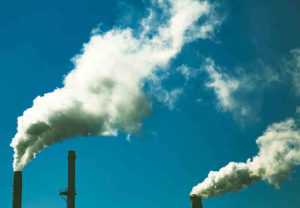5 Effects of Energy Waste Explained
Effects of energy waste are; air pollution, soil and water pollution, economic losses, industrial inefficiency, and climate change.
This article discusses the effects of energy waste, as follows;
1). Air Pollution (as one of the Effects of Energy Waste)
Air pollution is a major effect of energy waste.
This is due to the degrading effect which gaseous fuels, and fuel combustion byproducts, have on air quality [3].
By products of fuel combustion include carbon dioxide, ground-level ozone, nitrous oxide, sulfuric gases, and particulate matter.
The magnitude in which these products are generated tends to increase with energy wastage, which involves excessive fuel combustion, and incomplete combustion, among others.
Waste energy production in electric generators, vehicles and other fuel-dependent systems, is associated with the release of air pollutants that have harmful effects on health and environmental quality.

2). Soil and Water Pollution
Soil and water pollution are potential forms of environmental degradation that may occur as a result of energy waste.
One of the ways in which this can occur is through resource extraction.
As fossil fuels like coal and petroleum are extracted through mining and drilling respectively, the byproducts of these extraction processes tend to interact with the environment.
Energy resource extraction also increases the risk of events like oil spillage and acid mine drainage pollution [4]. These processes impact soil and water negatively, polluting lakes, streams and soils within the environs.
Energy wastage may also occur in the form of improper waste management. This is because the effective recycling of waste materials is a measure of energy conservation that reduces the wastage of energy in continuous, unsustainable raw material extraction and manufacturing.
Improper waste management pollutes soil and water with toxic materials. Organic waste (biomass) may release products of partial biodegradation such as organic acids and leachate, while inorganic waste may release contaminants like heavy metals [2].
These materials reduce the agricultural productivity of soil, as well as the potability of water.

3). Economic Losses (as one of the Effects of Energy Waste)
Energy waste causes economic losses, from the cost of energy that is unused.
Because energy is derived mostly from costly raw materials, processes and equipment, its wastage implies that the value of these materials are lost.
Lost energy increases the economic impact of energy consumption, such that the degree of inefficiency in energy usage is proportional to the economic losses incurred [1].
Also, the environmental impacts of waste energy lead to extra cost. This cost is incurred mainly in environmental remediation, infrastructure repair and healthcare.
4). Industrial Inefficiency
Industrial processes generally involve the conversion and transfer of energy.
As a result, energy losses and wastage, are an indication and a source of inefficiency. This includes waste heat that could be lost to the environment from industrial systems, and electricity that could be discharged in the process of transmission.
Measures to increase the energy efficiency of industrial systems include the design and implementation of cogeneration equipment, changes in material and design.
5). Climate Change (as one of the Effects of Energy Waste)
Energy waste is associated with greenhouse gas emission, which is a major cause of climate change.
In scenarios where energy is being used for electricity generation or domestic heating, gases emitted can cause climatic variability and global warming; and may facilitate environmental issues like heat waves and desertification.
Conclusion
Effects of energy waste are;
1. Air Pollution
2. Soil and Water Pollution
3. Economic Losses
4. Industrial Inefficiency
5. Climate Change
References
1). Chen, C.; Su, M.; Liu, G.; Yang, Z. (2013). “Evaluation of economic loss from energy-related environmental pollution: A case study of Beijing.” Frontiers of Earth Science 7(3). Available at: https://doi.org/10.1007/s11707-013-0360-4. (Accessed 20 September 2022).
2). Nguyễn, N.; Nakajima, J.; Takaoka, M.; Nguyen, T. A. (2019). “Heavy metal speciation in landfill leachate and its association with organic matter.” IOP Conference Series Earth and Environmental Science 266:012006. Available at: https://doi.org/10.1088/1755-1315/266/1/012006. (Accessed 21 September 2022).
3). Perera, F. P. (2017). “Pollution from Fossil-Fuel Combustion is the Leading Environmental Threat to Global Pediatric Health and Equity: Solutions Exist.” International Journal of Environmental Research and Public Health 15(1):16. Available at: https://doi.org/10.3390/ijerph15010016. (Accessed 21 September 2022).
4). Ugya, A.; Ajibaden, F. O.; Ajibade, T. F. (2018). “Water Pollution Resulting From Mining Activity: An Overview.” Proceedings of the 2018 Annual Conference of the School of Engineering & Engineering Technology (SEET), The Federal University of Technology, Akure, Nigeria. Volume: 3. Available at: https://www.researchgate.net/publication/326925600_Water_Pollution_Resulting_From_Mining_Activity_An_Overview. (Accessed 21 September 2022).


